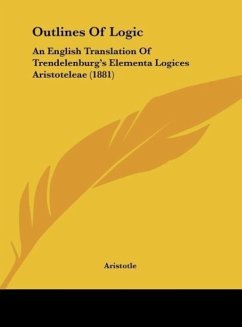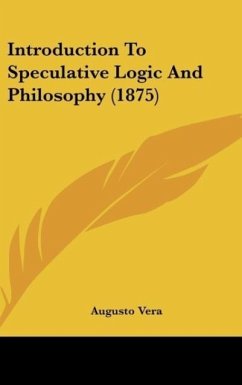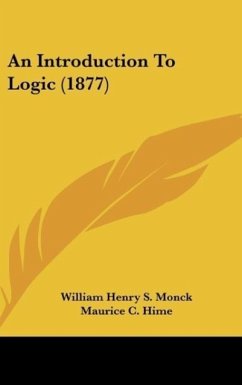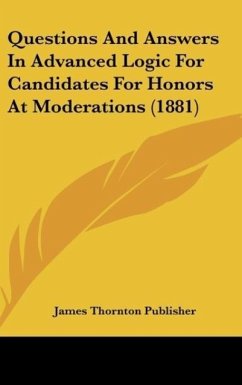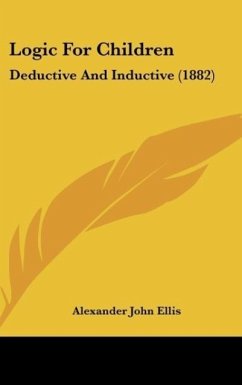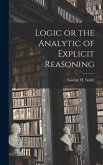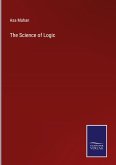Aristotle
Outlines Of Logic
An English Translation Of Trendelenburg's Elementa Logices Aristoteleae (1881)
29,99 €
inkl. MwSt.
Versandfertig in 1-2 Wochen

15 °P sammeln
Aristotle
Outlines Of Logic
An English Translation Of Trendelenburg's Elementa Logices Aristoteleae (1881)
- Gebundenes Buch
- Merkliste
- Auf die Merkliste
- Bewerten Bewerten
- Teilen
- Produkt teilen
- Produkterinnerung
- Produkterinnerung
This book is a facsimile reprint and may contain imperfections such as marks, notations, marginalia and flawed pages.
Andere Kunden interessierten sich auch für
![Introduction To Speculative Logic And Philosophy (1875) Introduction To Speculative Logic And Philosophy (1875)]() Augusto VeraIntroduction To Speculative Logic And Philosophy (1875)32,99 €
Augusto VeraIntroduction To Speculative Logic And Philosophy (1875)32,99 €![An Introduction To Logic (1877) An Introduction To Logic (1877)]() William Henry S. MonckAn Introduction To Logic (1877)31,99 €
William Henry S. MonckAn Introduction To Logic (1877)31,99 €![Questions And Answers In Advanced Logic For Candidates For Honors At Moderations (1881) Questions And Answers In Advanced Logic For Candidates For Honors At Moderations (1881)]() James Thornton PublisherQuestions And Answers In Advanced Logic For Candidates For Honors At Moderations (1881)30,99 €
James Thornton PublisherQuestions And Answers In Advanced Logic For Candidates For Honors At Moderations (1881)30,99 €![Logic For Children Logic For Children]() Alexander John EllisLogic For Children31,99 €
Alexander John EllisLogic For Children31,99 €![Logic or the Analytic of Explicit Reasoning Logic or the Analytic of Explicit Reasoning]() George H. SmithLogic or the Analytic of Explicit Reasoning37,99 €
George H. SmithLogic or the Analytic of Explicit Reasoning37,99 €![The Science of Logic The Science of Logic]() Asa MahanThe Science of Logic79,90 €
Asa MahanThe Science of Logic79,90 €![Logic and Argument Logic and Argument]() James Hervey HyslopLogic and Argument22,90 €
James Hervey HyslopLogic and Argument22,90 €-
-
-
This book is a facsimile reprint and may contain imperfections such as marks, notations, marginalia and flawed pages.
Hinweis: Dieser Artikel kann nur an eine deutsche Lieferadresse ausgeliefert werden.
Hinweis: Dieser Artikel kann nur an eine deutsche Lieferadresse ausgeliefert werden.
Produktdetails
- Produktdetails
- Verlag: Kessinger Publishing, LLC
- Seitenzahl: 30
- Erscheinungstermin: 23. Mai 2010
- Englisch
- Abmessung: 286mm x 221mm x 7mm
- Gewicht: 364g
- ISBN-13: 9781161906912
- ISBN-10: 1161906916
- Artikelnr.: 30966563
- Herstellerkennzeichnung
- Libri GmbH
- Europaallee 1
- 36244 Bad Hersfeld
- gpsr@libri.de
- Verlag: Kessinger Publishing, LLC
- Seitenzahl: 30
- Erscheinungstermin: 23. Mai 2010
- Englisch
- Abmessung: 286mm x 221mm x 7mm
- Gewicht: 364g
- ISBN-13: 9781161906912
- ISBN-10: 1161906916
- Artikelnr.: 30966563
- Herstellerkennzeichnung
- Libri GmbH
- Europaallee 1
- 36244 Bad Hersfeld
- gpsr@libri.de
Aristotle (Greek: ¿¿¿¿¿¿¿¿¿¿¿ Aristotél¿s, pronounced [aristotél¿¿s]; 384-322 BC)[A] was a Greek philosopher and polymath during the Classical period in Ancient Greece. Taught by Plato, he was the founder of the Lyceum, the Peripatetic school of philosophy, and the Aristotelian tradition. His writings cover many subjects. including physics, biology, zoology, metaphysics, logic, ethics, estheticspoetry, theatre, music, rhetoric, psychology, linguistics, economics, politics, and government. Aristotle provided a complex synthesis of the various philosophies existing prior to him. It was above all from his teachings that the West inherited its intellectual lexicon, as well as problems and methods of inquiry. As a result, his philosophy has exerted a unique influence on almost every form of knowledge in the West and it continues to be a subject of contemporary philosophical discussion. Little is known about his life. Aristotle was born in the city of Stagira in Northern Greece. His father, Nicomachus, died when Aristotle was a child, and he was brought up by a guardian. At seventeen or eighteen years of age he joined Plato's Academy in Athens and remained there until the age of thirty-seven (c. 347 BC).[4] Shortly after Plato died, Aristotle left Athens and, at the request of Philip II of Macedon, tutored Alexander the Great beginning in 343 BC.[5] He established a library in the Lyceum which helped him to produce many of his hundreds of books on papyrus scrolls. Though Aristotle wrote many elegant treatises and dialogues for publication, only around a third of his original output has survived, none of it intended for publication.[6] Aristotle's views on physical science profoundly shaped medieval scholarship. Their influence extended from Late Antiquity and the Early Middle Ages into the Renaissance, and were not replaced systematically until the Enlightenment and theories such as classical mechanics. Some of Aristotle's zoological observations found in his biology, such as on the hectocotyl (reproductive) arm of the octopus, were disbelieved until the 19th century. His works contain the earliest known formal study of logic, studied by medieval scholars such as Peter Abelard and John Buridan. Aristotle's influence on logic also continued well into the 19th century. He influenced Islamic thought during the Middle Ages, as well as Christian theology, especially the Neoplatonism of the Early Church and the scholastic tradition of the Catholic Church. Aristotle was revered among medieval Muslim scholars as "The First Teacher" and among medieval Christians like Thomas Aquinas as simply "The Philosopher". His ethics, though always influential, gained renewed interest with the modern advent of virtue ethics, such as in the thinking of Alasdair MacIntyre and Philippa Foot.
